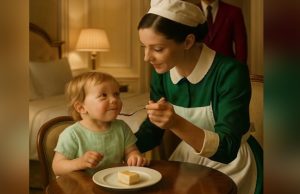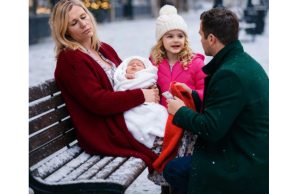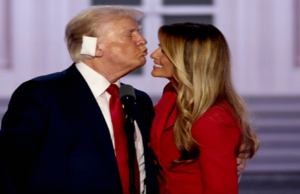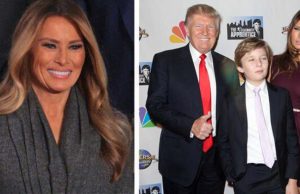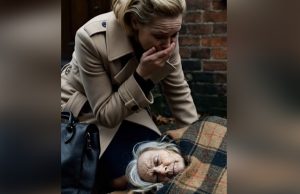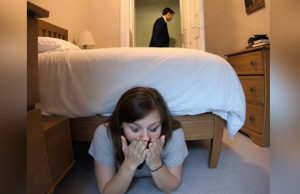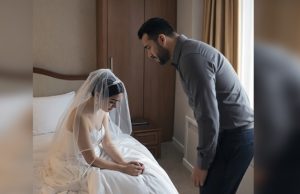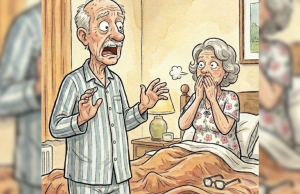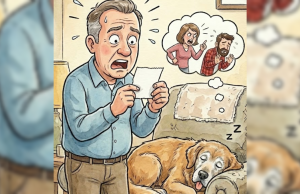
The winter wind swept through Oakbridge like ancient voices threading the trees.
Snowflakes danced down like soft ash, blanketing rooftops, sidewalks, and the unnoticed figures that slipped between streetlights. Though the holidays lit the town with sparkle and cheer, not everyone had a door to close behind them.
At the far end of Main Street, where frost clung to broken pavement edges, a small girl stood still.
Her coat, far too big, hung off her frame and split at the seams. Her sneakers—once bright—were now dull, soaked, and worn. She pressed her small face to the bakery glass, watching golden rolls rise in the oven, her breath painting soft clouds on the pane.
She didn’t move. Didn’t knock. Didn’t speak.
Her name was Lily Parker.
Six days ago, her mother had brought her here and whispered with trembling lips, “Wait right here, sweetheart. I’ll be back soon, I promise.”
Then she disappeared.
Lily had waited ever since.
At first with wide, hopeful eyes. Then in silence. Now, she waited simply because it was all she remembered how to do—her sense of time frozen like the world around her.
At night, she curled behind the library on a wooden bench under a flickering streetlamp. She ate only what strangers dropped or tossed. No one asked. No one noticed.
Until someone did.
Across the street, from a snow-dusted café window, an elderly man stirred his coffee. His name was Howard Bellamy—a name once etched in the bones of Oakbridge. He had funded half the town. Owned even more. But success hadn’t kept sorrow away.
His partner, gone a decade.
His daughter, distant by choice.
And his grand house on the hill, though still grand, echoed with silence.
Every day, he came to this café. Same table. Same bitter coffee. Same emptiness.
But that day… something broke through.
He looked up—and saw her, framed beyond the frosted glass.
A child. Still as marble. Hollow eyes, pale skin. Watching pastries like she could pull them through the window by will alone.
Howard’s spoon froze.
He watched her for minutes that felt like hours. She didn’t flinch. Something long dormant stirred in his chest—a quiet ache, warm and old.
He stood, gripped his cane, and stepped into the snow.
As he neared, she startled, retreating.
“I wasn’t taking anything,” she said quickly, backing up.
“I don’t think you were,” Howard replied gently. His voice, though rough with age, was even. Kind. “But you look like someone who could use a warm bite.”
Lily paused.
“I can get you lunch. No tricks. Just food. In the café. You can leave whenever you want.”
Her stomach twisted with the smell of butter and heat. She gave a small nod.
They walked in together. She trailed beside him, clutching her sleeves like armor.
At their table, Howard ordered cocoa overflowing with marshmallows and the thickest soup the café offered. She devoured it without a word, eyes flicking constantly. But Howard didn’t rush her. He just watched with quiet focus, noting every invisible bruise the world had pressed into her spirit.
Then, at last, he asked, “What’s your name?”
“Lily,” she whispered.
“And where’s your family, Lily?”
She stiffened. “Gone,” she murmured. “Mom said she’d come back. But she never did.”
Howard’s hands tightened around his cup.
“I thought maybe she just… forgot,” Lily added, her voice no louder than a thought.
Howard turned away slightly, the memory of his own daughter—the slammed door, the silence that followed—flickering like firelight in his mind.
“I know how that feels,” he said quietly. “Being left behind.”
They sat without speaking. Then, slowly, Howard offered a soft, sincere smile.
“You know,” he said, “I spent years thinking I’d never have a family again. But maybe… maybe life still has plans for us.”
Lily looked up, eyes wide.
He cleared his throat. His voice wavered.
“Would you mind if I asked you something a little strange?”
She tilted her head.
Howard leaned closer. His next words came like snow—quiet and heavy.
“Would you want to be my granddaughter?”
The world seemed to still.
Lily stared at him. Her spoon slipped from her hand and clinked against the table.
“You… you mean it?”
His eyes shimmered. “More than anything.”
A tear slid down her cheek. She stood, walked to his side, and wrapped her arms around him with a strength born of too many lonely nights.
He held her close. They didn’t speak.
But something shifted inside them both.
Two lost hearts had found a home—in each other.
Three Months Later
The Bellamy house no longer echoed with stillness. It sang with laughter.
Lily zipped through the halls in fuzzy socks, chasing Howard’s old dog Max with gleeful shrieks. The once-pristine parlor now hosted a toy chest, a half-finished puzzle, and crayon drawings pinned above the fireplace.
Howard read bedtime stories aloud, his voice warm and worn. He brushed her hair into lopsided braids. On Sundays, she made pancakes—he swore they were the best he’d ever eaten.
And each night, she kissed his cheek and whispered, “Goodnight, Grandpa.”
One Year Later
At the winter recital, Lily stood on stage, violin quivering in her hands. The curtain rose. She searched the seats—and found him.
Howard, front row. In a bright holiday sweater, holding daisies.
She played.
Afterward, she dashed into his arms.
“I did okay?”
“You were a shining star,” he said, voice thick with pride.
Lily looked up, glowing. “Do you think my mom would’ve been okay with this?”
Howard touched her cheek. “I think she’d be thankful someone cherishes you like this.”
She smiled. “Good. Because I’m keeping you.”
Later that year, they opened The Bellamy Foundation for Lost Hearts—a haven for kids without homes and elders with no visitors. A place where second chances weren’t miracles—they were everyday promises.
And every December 18th, they returned to that bakery window. Not to mourn.
But to remember the moment when two strangers chose each other.
Because family isn’t always something you’re born into.
Sometimes, it’s something you choose.
And sometimes, it starts with a single question whispered into winter air:
“Would you like to be my granddaughter?”
And a child brave enough to say yes.

